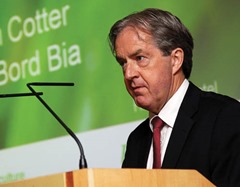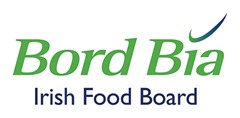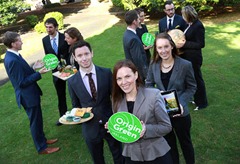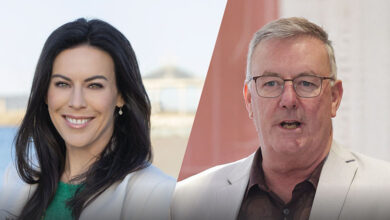A promising future for food exports
![]() Bord Bia Chief Executive Aidan Cotter speaks to Owen McQuade about Ireland’s agri-food export performance and the thinking and science behind the successful Origin Green sustainability programme.
Bord Bia Chief Executive Aidan Cotter speaks to Owen McQuade about Ireland’s agri-food export performance and the thinking and science behind the successful Origin Green sustainability programme.
Four consecutive years of growth set Ireland’s agri-food industry apart as a success story at a time when the rest of the economy has faced a difficult time. Now, as recovery picks up, Aidan Cotter sees Irish food and drink as having a key role to role to play in growing the economy and reaching new markets.
“The industry’s export value in 2013 was 40 per cent higher than in 2009, having added over €3 billion in the intervening time and reaching nearly €10 billion in total,” he points out.
Growth has been experienced across all the sectors which make up the food industry. Last year, in particular, the dairy sector grew by 15 per cent and the meat sector by 10 per cent. Sales of prepared foods and dairy by-products also increased. In general, beverage exports grew more slowly but whiskey exports reached double digits – “a very significant success story and growth is expected at the same rate going forward.”
The UK remains Ireland’s largest market, accounting for 41 per cent of agri-food exports from the State. However, continental Europe grew by 11 per cent last year: above the average of 9 per cent and a sign of recovery.
Growth in markets outside the EU was slower at 6 per cent although this includes a continued very strong performance in China (worth around €290 million). Exports to China have trebled since 2009 and the country is now Ireland’s second largest market for dairy products, the third largest for pork and the sixth largest overall. Infant formula represents around 80 per cent of Chinese-bound Irish dairy exports.
 “Tapping into 180 markets last year, we stand out as the largest net exporter of beef in the northern hemisphere and indeed the supplier of 10 per cent of the world’s infant formula output,” Cotter adds. “Agri-food has therefore made a central contribution to economic recovery over recent years.”
“Tapping into 180 markets last year, we stand out as the largest net exporter of beef in the northern hemisphere and indeed the supplier of 10 per cent of the world’s infant formula output,” Cotter adds. “Agri-food has therefore made a central contribution to economic recovery over recent years.”
The next 12 months will represent the last year before the EU quota on milk production is lifted. All the indications are that, once this has been removed, dairy farms will expand by as much as 50 per cent by the end of the decade: “That’s the target in Food Harvest 2020 and progress is confirmed by surveys of farmers’ intentions.”
Risks are always present, notably the current volatility in the global industry, which is struggling to keep pace with the growth in the global demand for food. The world’s population is growing at the rate of 18 million people per year while the size of the middle class is growing by 150 million people per year.
“Demand for food, and especially the protein-based products in which Ireland specialises, is assured,” he reflects. “A strong yield of crops in one year can lead to prices falling down; the expansion in livestock for dairy, pork and other meats is probably a reflection of that trend. Prices can suddenly rise again and much of the volatility is again down to drought or flooding.”
Bord Bia launched its Origin Green programme in June 2012 with the support of An Taoiseach and the Minister for Agriculture, Food and the Marine: “We have articulated an ambition for the becoming a world leader in sustainability and defined what we meant by that.”
Every farm and food and drink manufacturing business would sign up to the sustainability agenda. By the end of 2014, 65 per cent of food and drink exports should be coming from businesses that are on the road to sustainability – rising to 100 per cent by 2016.
“We secondly pledged to measure what matters for sustainability, recognising its multi-dimensional nature,” he explains. “This ranges from energy emissions to water and wastewater management to biodiversity, food safety and all areas of social responsibility.”
Taking the broadest definition of the concept – set down by the UN – Bord Bia seeks to meet the needs of the present without compromising the ability of future generations to meet their needs. It recognises the existence of a triple bottom line: people, profit and planet.
The economic definition of sustainability is “a must-have without which nothing else can be done.”
Thirdly, all measures are subject to international accreditation or independent verification. Finally, Bord Bia recognises that is not about measurement but continuous improvement and access to leading edge science.
“The industry was already starting from a good place: an island on the edge of the Atlantic, washed by the Gulf Stream and largely passed over by the Industrial Revolution,” Cotter notes. “Our air quality is the best in Europe and our seas are ten times the size of our landmass – an exceptional environment for the production of seafood.”
European Commission research shows that Ireland has the joint lowest carbon footprint for dairy in Europe and the fifth lowest for its beef industry. Importantly, we have “no shortage of water” in stark contrast to many countries around the world today.
Cotter then sums up the green case for Irish agriculture. “We are going to have to expand food production across the world,” he surmises, “and arguably that food should be produced in the regions of the world that contribute least to greenhouse gas emissions – and having a joint lowest carbon footprint backs up Ireland’s case. The island has a comparative advantage for producing grass (as opposed to crops), which we need to maximise.”
A team of auditors was already visiting 20,000 farms and food businesses on an annual basis across a range of enterprises, looking at food safety, traceability, animal health and welfare, and the environment.
Since 2009, Bord Bia has been working with the UK Carbon Trust and it has been accredited to the PS:200050 standard for carbon footprint calculation models.
All 43,000 beef farms in the State have now been footprinted and the process is now being rolled out across the 18,000 enterprises that make up the dairy sector: a process of measurement, feedback and continuous improvement.
“Findings are collected on a handheld device and then fed into a central database,” he explains. “When the audit is complete, information is supplemented by extracts from the department’s databases about movement on and off the farm since the previous audit along with their ages and genetics. After that, we feed back the information to the farmer and also give them ‘dashboard’ information so they can compare themselves with peers in similar enterprises.”
Bord Bia and Teagasc have developed a carbon navigator tool which can assess (over six different criteria) how changes to the enterprise can make the farm more efficient financially and in carbon terms.
The overall aim is to make the industry “more homogenous” and bring down the average level of emissions. Farmers can make significant improvements and we’re working very closely with Teagasc in this area. “Ireland is a world leader in this field, with no other country having such an extensive system,” Cotter remarks.
Sustainable manufacturing
Bord Bia also launched a sustainability charter at the same time, which asks every food and drink manufacturing firm to draw up a three-to-five year sustainability development plan.
The companies set targets and timelines that are most relevant to their business and agree a baseline with us, and the plan is independently verified by SGS – a world leader in verification services.
Companies are asked to assess three areas: raw material sourcing and certification; manufacturing processes, including energy, emissions, waste management, water use and biodiversity; and social sustainability.
“The last area,” he notes, “includes investment in community initiatives, employee well-being programmes, and health and nutrition policies. Some companies, for example, have set targets to reduce the amount of fat, salt and artificial flavourings in their food.”
To date, 331 companies have registered (representing most exporters), while 48 have progressed to become verified members. “We’re well on track to meet our targets. We have workshops and a workbook for companies to help with their plans.” The Environmental Protection Agency’s Business Support Programme and Bord Iascaigh Mhara’s Green Seafood Programme also assist firms.
Supporting sustainability
Support is needed, not just in setting the targets but in actually achieving the targets afterwards. Bord Bia’s Global Sustainability Conference took place in the Dublin Convention Centre last September to create debate and dialogue about the way ahead for food and drink.
A “remarkable level” of endorsement for Origin Green was expressed among the 700 delegates (350 from overseas).
€3.5 million per year will be invested into business-to-business communication as the programme develops and this involves 10 Origin Green ambassadors: young graduates who already have three to five years’ workplace experience. Inductions began at the Michael Smurfit Graduate Business School last September and since January, they have been placed in 10 different locations around the world e.g. at Coca Cola in Atlanta or the World Wildlife Fund in Washington DC.
Two-way dialogue is encouraged over their two-year term: “The ambassadors learn about how these businesses practice sustainability and bring information back while also sharing our message with global organisations.”
Bord Bia wants companies to promote Origin Green in all their interactions with customers. “We are participating in 15 international exhibitions this year, attended by 800,000 executives, and again getting the message out about what Irish food and drink stands for,” he explains.
To sum up why this matters, the roots of the programme go back to 2008 when PwC researched leading agri-food industries across Europe. The message came back that Ireland could no longer just claim that it was “clean and natural” but also needed to prove it.
Cotter concludes: “Agri-food growth is, as a consequence, both smart and green and promises to drive substantial further value into the Irish economy going forward.”
 Bord Bia
Bord Bia
Clanwilliam Court
Lower Mount Street, Dublin 2
Tel: + 353 1 668 5155
Email: info@bordbia.ie
Web: www.bordbia.ie
Join the conversation on twitter: @bordbia and follow Bord Bia on Linkedin






